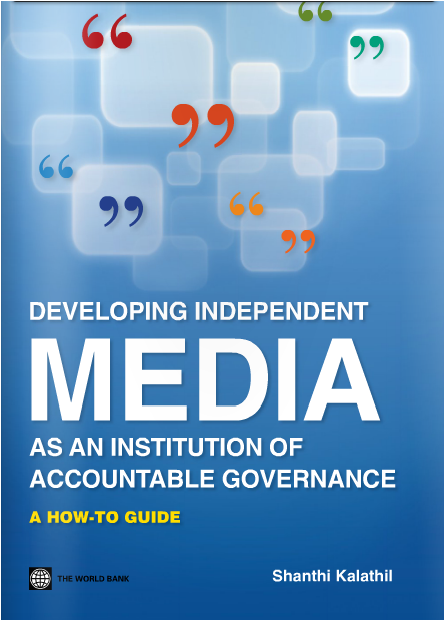Over 50 people attended the discussion hosted by CIMA on November 3, 2011. Independent media play a crucial role in underpinning good governance, and many development organizations are increasingly interested in supporting media programs. While stakeholders use the media to communicate development messages, they are sometimes less knowledgeable about how to strengthen the media sector itself as an instrument of accountability. Moreover, governance advisors are often unfamiliar with how best to provide media assistance within various political and economic environments and within a project’s budget. As a result, this fundamental piece of the governance reform agenda is sometimes neglected. The World Bank’s Communication for Governance and Accountability Program addresses this gap with Developing Independent Media as an Institution of Accountable Governance: A How-To Guide. The toolkit provides advice for donors, foundations, and other stakeholders who are interested in media development, but who need help assessing relevant institutions and actors. It helps users understand what drives or blocks reform in the media sector and identify the most promising entry points for an independent media development program. The toolkit is the result of a multi-year process of consultations with experts from international organizations, bilateral donors, and media development organizations, including the Center for International Media Assistance.

Featuring:
Shanthi Kalathil
Author, Developing Independent Media as an Institution of
Accountable Governance: A How-To Guide
Sherry Ricchiardi
American Journalism Review
Kevin Sturr
USAID*
About the speakers
Shanthi Kalathil is an international development consultant and author, who focuses on the intersection between development, democracy, and international security, with an emphasis on issues of voice and accountability. Previously a senior democracy fellow and senior media advisor at the U.S. Agency for International Development, she is a regular consultant for the Communication for Governance and Accountability Program at the World Bank, and consults for a variety of other organizations on development and security issues. Kalathil is co-author of Open Networks, Closed Regimes: The Impact of the Internet on Authoritarian Rule, which examines the role of the Internet in promoting political transition in eight authoritarian and semi-authoritarian regimes. She has spent the past decade advising the U.S. government, international organizations, and civil society groups on the policy and practical aspects of support for traditional and new media as a function of good governance. Formerly based as a staff reporter in Hong Kong for the Wall Street Journal Asia, Kalathil holds degrees from UC Berkeley and the London School of Economics and Political Science.
Sherry Ricchiardi is a senior contributing writer for American Journalism Review (AJR), specializing in international issues, and a professor at the Indiana University School of Journalism. Ricchiardi has trained journalists in developing countries throughout the world, including Pakistan, Yemen, and China. She is on the advisory committee of the Dart Center for Journalism and Trauma at Columbia University. Ricchiardi has been a Fulbright scholar at Zagreb University in Croatia and serves on the peer review committee for the Fulbright Specialist Program. Before going into media development, she spent 14 years at the Des Moines Register as an investigative reporter and Sunday magazine writer. She later became city editor for the Columbia Missourian, a newspaper produced at the University of Missouri School of Journalism, her alma mater. During the war in the Balkans, Ricchiardi’s stories from the front lines appeared in several American publications, including the Miami Herald, St. Louis Post-Dispatch, and AJR. She is the author of CIMA’s March 2011 report Iraq’s News Media After Saddam: Liberation, Repression, and Future Prospects. In 2003 and 2009, she won the National Press Club’s top award for press criticism.
Kevin Sturr is a foreign service officer with the U.S. Agency for International Development (USAID). Currently in the Governance Division of the Democracy and Governance Office, he will be the interim chief for the human rights team in the Democracy, Governance, and Human Rights Center, which USAID will open soon under its Bureau of Democracy, Conflict, and Humanitarian Assistance. Sturr has served at USAID missions in Senegal, Zimbabwe, and Bangladesh. He was also a field representative for USAID’s Famine Early Warning System in Nouakchott, Mauritania, and in the Sahel Regional Office in Bamako from 1993 to 2000. He earned his bachelor’s degree in political science from Columbia University and studied public interest law at the City University of New York, as well as international health at Tulane University. Sturr was a Peace Corps volunteer in Mali from 1987 to 1990.
*Note: Kevin Sturr’s comments will reflect his own opinions and experiences. They will not represent the opinions or policies of USAID.
The Center for International Media Assistance, an initiative of the National Endowment for Democracy, brings together a broad range of media experts with the goal of strengthening the support for and improving the effectiveness of media assistance programs by providing information, building networks, and conducting research on the indispensable role independent media play in creating sustainable democracies around the world.
